Lida Group Transforms Worker Accommodation Standards with High-Quality Container House Solutions for Modern Labor Camps
2025-Sep-16 14:29:07
By Admin
1. Introduction
In the fast-paced world of industrial development, infrastructure construction, and large-scale project execution, the living conditions of workers have long been a topic that demands urgent attention. Worker camps, which serve as the temporary homes for thousands of laborers engaged in sectors such as construction, mining, energy, and logistics, have historically struggled with subpar accommodation standards. Issues like poor sanitation, inadequate space, lack of basic amenities, and slow construction of traditional housing have not only affected the physical and mental health of workers but also undermined their productivity and overall job satisfaction. As global industries continue to prioritize sustainability, efficiency, and social responsibility, there is an urgent need for innovative solutions that can address these long-standing challenges in worker accommodation.
Lida Group, a leading provider of prefabricated building solutions, has emerged as a game-changer in this domain. With its focus on high-quality container house solutions, the company has set out to transform the standards of modern worker camps. Container houses, once primarily associated with shipping and temporary storage, have evolved significantly in recent years, thanks to advancements in design, materials, and construction technologies. Lida Group has harnessed these advancements to create container-based accommodation that is not only durable, safe, and comfortable but also sustainable, cost-effective, and adaptable to diverse environmental and project requirements. This article explores how Lida Group’s container house solutions are revolutionizing worker accommodation, the key features and benefits of these solutions, real-world applications, and the broader impact on the industry and worker well-being.
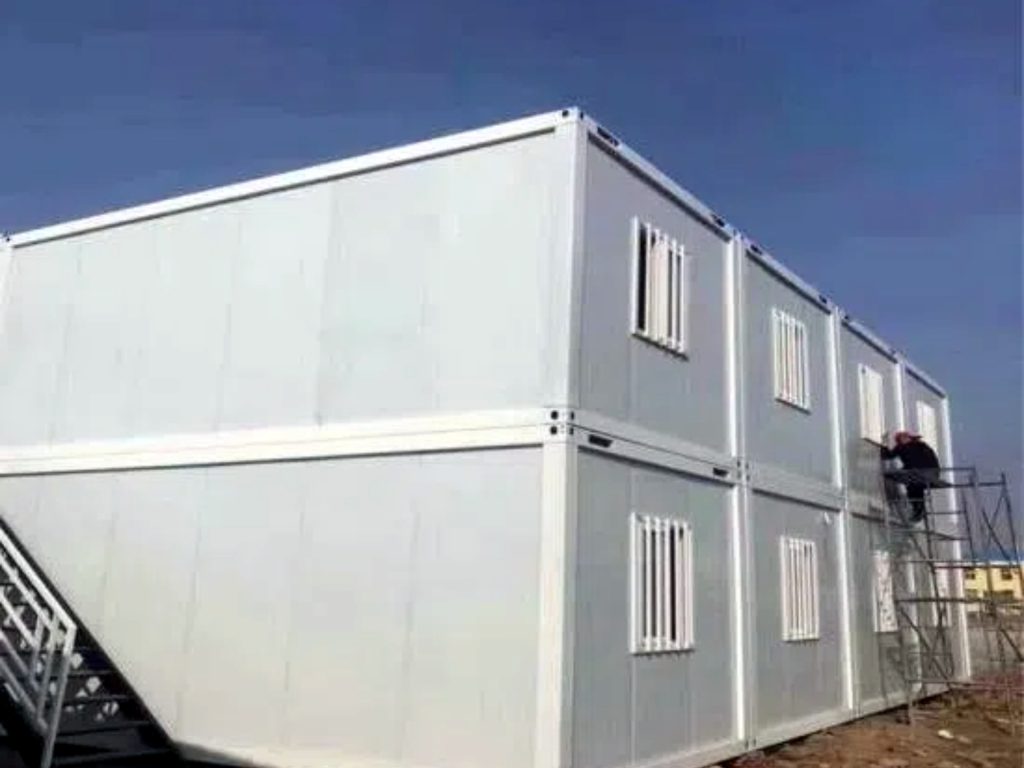
2. The Current State of Worker Accommodation: Challenges and Gaps
Before delving into Lida Group’s innovations, it is crucial to understand the existing challenges in worker accommodation that have created a pressing need for change. Worker camps, especially those in remote or construction-intensive areas, often face a range of issues that compromise the quality of life for residents.
2.1 Inadequate Space and Poor Layout
Traditional worker accommodation, such as makeshift tents, prefabricated sheds with outdated designs, or even repurposed buildings, frequently suffer from cramped spaces. Workers often have to share small rooms with multiple colleagues, leaving little to no personal space. This lack of privacy can lead to increased stress, conflicts among roommates, and a decline in mental well-being. Additionally, poor layout planning in these camps often results in inefficient use of space, with common areas (such as dining halls, recreation rooms, and bathrooms) being either too small or poorly located, making it difficult for workers to access essential facilities conveniently.
2.2 Sanitation and Hygiene Issues
Sanitation is another major concern in many worker camps. Inadequate bathroom and shower facilities, infrequent cleaning, and lack of proper waste management systems can lead to the spread of diseases. For example, in some remote construction camps, workers may have to share a limited number of toilets and showers, leading to long queues and unsanitary conditions. This not only poses health risks but also violates basic human dignity, affecting workers’ morale and willingness to stay on the job for extended periods.
2.3 Vulnerability to Environmental Factors
Worker camps are often located in areas with harsh environmental conditions, such as extreme temperatures (both hot and cold), heavy rain, strong winds, or high humidity. Traditional accommodation structures are often not designed to withstand these conditions. For instance, tents may leak during rainstorms, while poorly insulated sheds can become extremely hot in summer or freezing cold in winter. This exposure to harsh weather not only makes workers uncomfortable but also increases the risk of illnesses like heatstroke or hypothermia, further impacting their productivity and health.
2.4 Slow Construction and High Costs
Constructing traditional worker accommodation is often a time-consuming and expensive process. It requires on-site labor, transportation of raw materials, and compliance with local building codes, which can cause delays, especially in remote areas where access to resources is limited. Moreover, the high costs associated with materials, labor, and maintenance can put a strain on project budgets, leading some companies to cut corners on accommodation quality to save money. This short-term cost-saving measure ultimately has long-term consequences, as it leads to higher turnover rates among workers and potential legal issues related to non-compliance with labor welfare regulations.
2.5 Lack of Sustainability
In an era where sustainability is a global priority, traditional worker accommodation often falls short in terms of environmental responsibility. Many temporary housing structures are made from non-recyclable materials, generate a large amount of construction waste, and have high energy consumption (due to poor insulation and inefficient heating/cooling systems). This not only contributes to environmental degradation but also fails to align with the sustainability goals of many modern companies and industries, which are increasingly expected to reduce their carbon footprint and adopt eco-friendly practices.
These challenges highlight the critical need for a new approach to worker accommodation—one that addresses space, sanitation, durability, efficiency, and sustainability. Lida Group’s container house solutions have been developed specifically to tackle these issues, offering a comprehensive and innovative alternative to traditional housing.
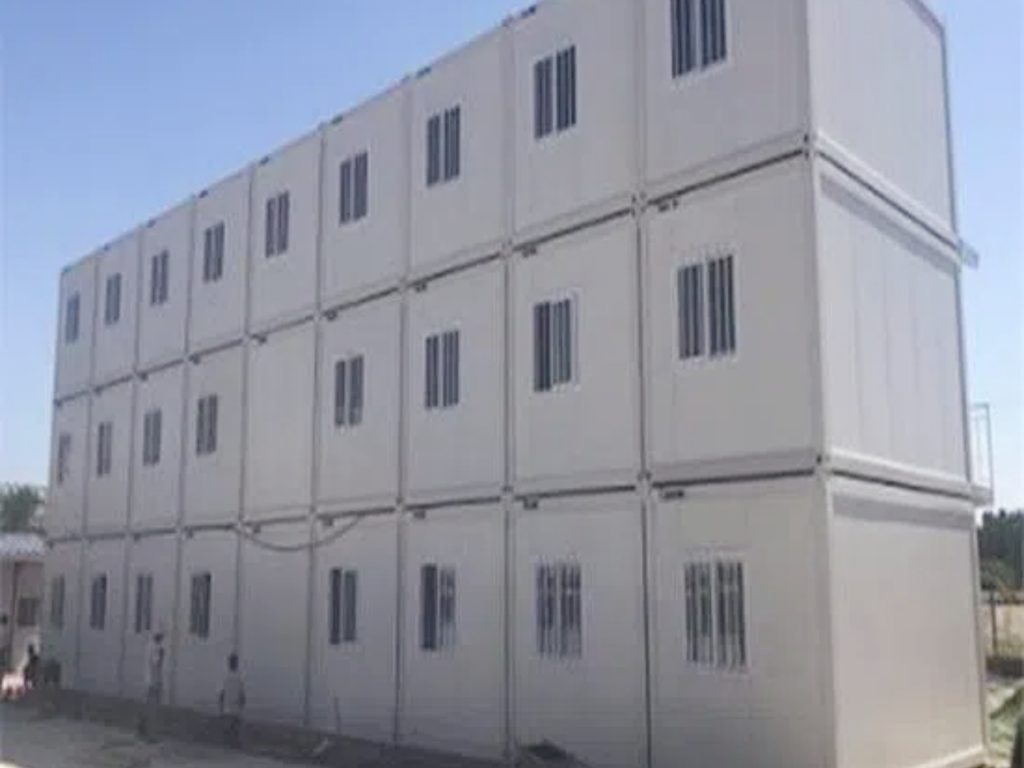
3. Lida Group: A Leader in Prefabricated and Container-Based Building Solutions
To understand the impact of Lida Group’s container house solutions, it is important to first recognize the company’s expertise and commitment to excellence in the prefabricated building industry. Founded with a vision to provide high-quality, efficient, and sustainable building solutions, Lida Group has spent years refining its technologies and processes, focusing on meeting the diverse needs of clients across various sectors.
3.1 Company Background and Core Values
Lida Group has established itself as a trusted name in the prefabricated building sector, with a global presence that spans multiple countries and regions. The company’s core values revolve around quality, innovation, sustainability, and customer satisfaction. From the initial design phase to manufacturing, installation, and after-sales service, Lida Group adheres to strict quality control standards to ensure that its products meet or exceed industry benchmarks. This commitment to quality has earned the company numerous certifications and accolades, including ISO 9001 (Quality Management System), ISO 14001 (Environmental Management System), and OHSAS 18001 (Occupational Health and Safety Management System), among others.
Innovation is another cornerstone of Lida Group’s operations. The company invests heavily in research and development (R&D) to stay ahead of emerging trends and technologies in the prefabricated building industry. Its team of engineers, architects, and design experts works tirelessly to develop new and improved solutions that address the evolving needs of clients, particularly in sectors like construction, mining, and energy, where worker accommodation is a critical component of project success.
Sustainability is also deeply ingrained in Lida Group’s business model. The company recognizes the importance of reducing the environmental impact of building projects and strives to incorporate eco-friendly practices into every stage of its operations. From using recyclable materials in manufacturing to designing energy-efficient structures, Lida Group is committed to promoting sustainable development and helping clients achieve their environmental goals.
3.2 Focus on Worker Accommodation
While Lida Group offers a wide range of prefabricated building solutions, including commercial buildings, residential homes, and temporary offices, the company has developed a strong focus on worker accommodation in recent years. This focus stems from a recognition of the challenges faced by workers in remote and industrial areas, as well as the need for businesses to prioritize worker welfare to enhance productivity and retention.
Lida Group’s team has conducted extensive research to understand the specific needs of workers in different industries. They have consulted with project managers, labor representatives, and workers themselves to identify the key features that make accommodation comfortable, safe, and functional. This user-centric approach has allowed the company to design container house solutions that are tailored to the unique requirements of modern worker camps, addressing issues like space, privacy, sanitation, and environmental resilience.
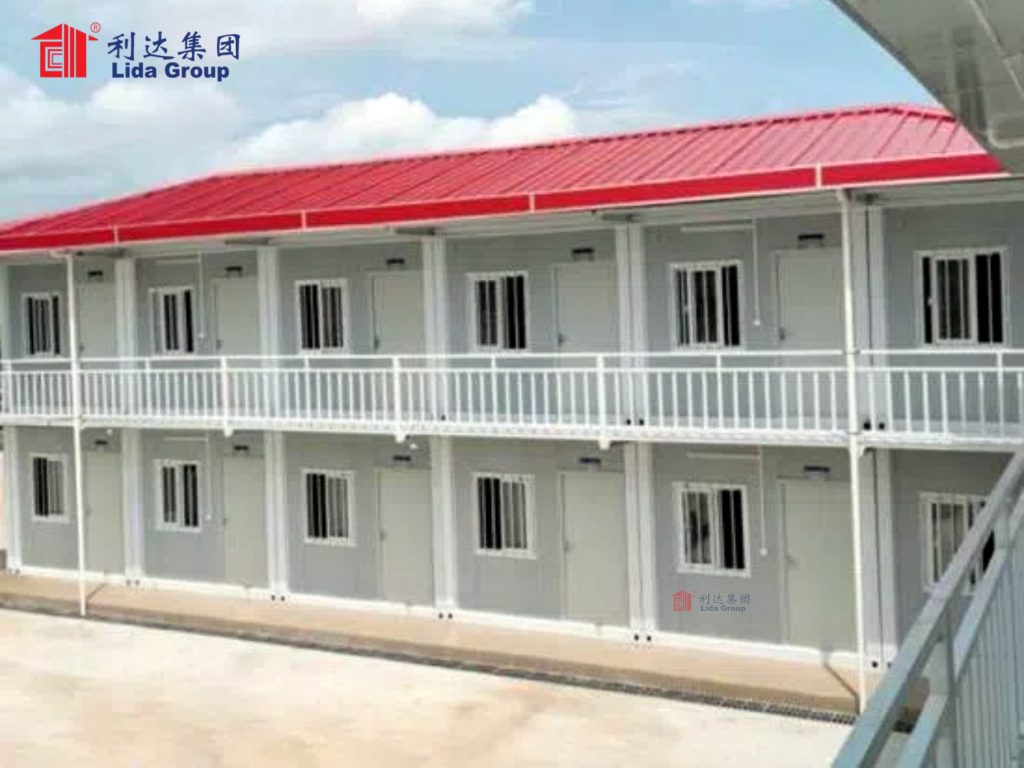
4. Key Features of Lida Group’s High-Quality Container House Solutions
Lida Group’s container house solutions stand out from traditional accommodation options due to their unique combination of durability, comfort, sustainability, and adaptability. The following are the key features that make these solutions a transformative choice for modern worker camps:
4.1 Durable and Safe Construction
One of the most significant advantages of Lida Group’s container houses is their durability. The containers used as the base structure are made from high-quality steel, which is known for its strength and resistance to wear and tear. This steel frame can withstand harsh environmental conditions, including strong winds, heavy rain, snow, and extreme temperatures, making the container houses suitable for use in a wide range of locations—from hot and arid construction sites to cold and snowy mining areas.
In addition to durability, safety is a top priority for Lida Group. The container houses are designed to meet strict safety standards, including fire resistance, earthquake resistance, and structural stability. The steel frame is reinforced to ensure that the structure can withstand external impacts, while fire-retardant materials are used in the interior fittings (such as walls, floors, and ceilings) to minimize the risk of fire. The houses also come equipped with smoke detectors, fire extinguishers, and emergency exits, ensuring that workers can evacuate safely in case of an emergency.
4.2 Spacious and Well-Designed Layouts
Unlike the cramped and poorly laid-out traditional worker accommodation, Lida Group’s container houses are designed to maximize space and provide workers with a comfortable living environment. The containers can be customized in terms of size, with standard options ranging from 20-foot to 40-foot lengths, and can also be stacked or connected to create larger living spaces. For example, two 40-foot containers can be connected side by side to form a spacious dormitory room that can accommodate multiple workers while still providing enough personal space for each.
The internal layout of the container houses is carefully planned to ensure functionality and comfort. Each room is designed with built-in storage solutions, such as wardrobes, shelves, and under-bed drawers, to help workers organize their personal belongings and keep the space tidy. Common areas, such as living rooms, dining halls, and recreation rooms, are also spacious and well-lit, providing workers with a place to relax, socialize, and unwind after a long day of work.
Privacy is another key consideration in the design of Lida Group’s container houses. The company offers options for single-occupancy rooms, double-occupancy rooms, or multi-occupancy rooms, depending on the client’s needs. In multi-occupancy rooms, partitions or dividers are used to create separate sleeping areas for each worker, ensuring that they have a certain level of privacy. Additionally, each room is equipped with a window and proper ventilation to allow natural light and fresh air to circulate, creating a more pleasant living environment.
4.3 Modern Sanitation and Hygiene Facilities
To address the sanitation issues that plague traditional worker camps, Lida Group’s container house solutions include modern and well-equipped bathroom and shower facilities. The bathrooms are designed to be spacious, clean, and easy to maintain, with multiple toilet stalls and shower cubicles to reduce waiting times. Each shower cubicle is equipped with hot water systems, which are essential for workers to clean themselves comfortably, especially in cold weather.
The company also pays close attention to waste management in its container house camps. Each camp is equipped with designated waste collection points, and Lida Group works with local service providers to ensure that waste is disposed of properly and in an environmentally friendly manner. Additionally, the container houses are designed with easy-to-clean surfaces, such as waterproof floors and washable wall panels, making it easier for camp managers to maintain hygiene standards.
4.4 Energy Efficiency and Sustainability
Lida Group’s container house solutions are designed to be energy-efficient, helping to reduce the carbon footprint of worker camps and lower operational costs for clients. The containers are insulated with high-quality materials, such as polyurethane foam or rock wool, which help to maintain a stable internal temperature regardless of external weather conditions. This insulation reduces the need for heating and cooling systems, thereby lowering energy consumption and costs.
In addition to insulation, Lida Group offers optional eco-friendly features for its container houses, such as solar panels, energy-efficient lighting (LED lights), and water-saving fixtures (low-flow toilets and showers). Solar panels can be installed on the roof of the container houses to generate renewable energy, which can be used to power lighting, heating, and other electrical appliances. LED lights consume less energy than traditional incandescent bulbs, while low-flow fixtures help to reduce water usage, making the camps more sustainable and cost-effective in the long run.
The use of recycled materials is another aspect of Lida Group’s commitment to sustainability. Many of the components used in the container houses, such as the steel frame and certain interior fittings, are made from recycled materials. Additionally, the prefabricated nature of the container houses means that construction waste is minimized, as most of the manufacturing process takes place in a controlled factory environment, where materials can be used more efficiently.
4.5 Quick Construction and Easy Installation
One of the biggest advantages of Lida Group’s container house solutions is their quick construction and easy installation. Unlike traditional housing, which requires weeks or even months of on-site construction, container houses are prefabricated in Lida Group’s factories. This means that all the components of the house, including the frame, walls, floors, and interior fittings, are manufactured and assembled in the factory before being transported to the project site.
Once the container houses arrive at the site, the installation process is relatively simple and fast. The containers can be placed on a pre-prepared foundation (which can be as simple as a gravel base or a concrete slab) and connected to utilities such as water, electricity, and sewage systems. In most cases, a worker camp consisting of multiple container houses can be set up within a matter of days or weeks, depending on the size of the camp. This quick installation time is particularly beneficial for projects that require workers to be on-site quickly, as it ensures that accommodation is available as soon as the workforce arrives.
4.6 Flexibility and Adaptability
Lida Group’s container house solutions are highly flexible and adaptable, making them suitable for a wide range of worker camp requirements. The containers can be customized to meet the specific needs of different industries and projects. For example, in a mining camp, where workers may need additional storage space for equipment, Lida Group can design container houses with extra storage rooms or external storage lockers. In a construction camp, where the workforce size may change over time, the container houses can be easily added to or removed from the camp to adjust the number of accommodation units.
The container houses can also be modified to include additional features based on client requests. For instance, some clients may require a camp with a medical clinic, a gym, or a training room. Lida Group can design and manufacture container-based facilities for these purposes, ensuring that the camp is fully equipped to meet the diverse needs of workers. Additionally, the container houses can be relocated to different sites once a project is completed, making them a cost-effective and sustainable option for companies that work on multiple projects in different locations.
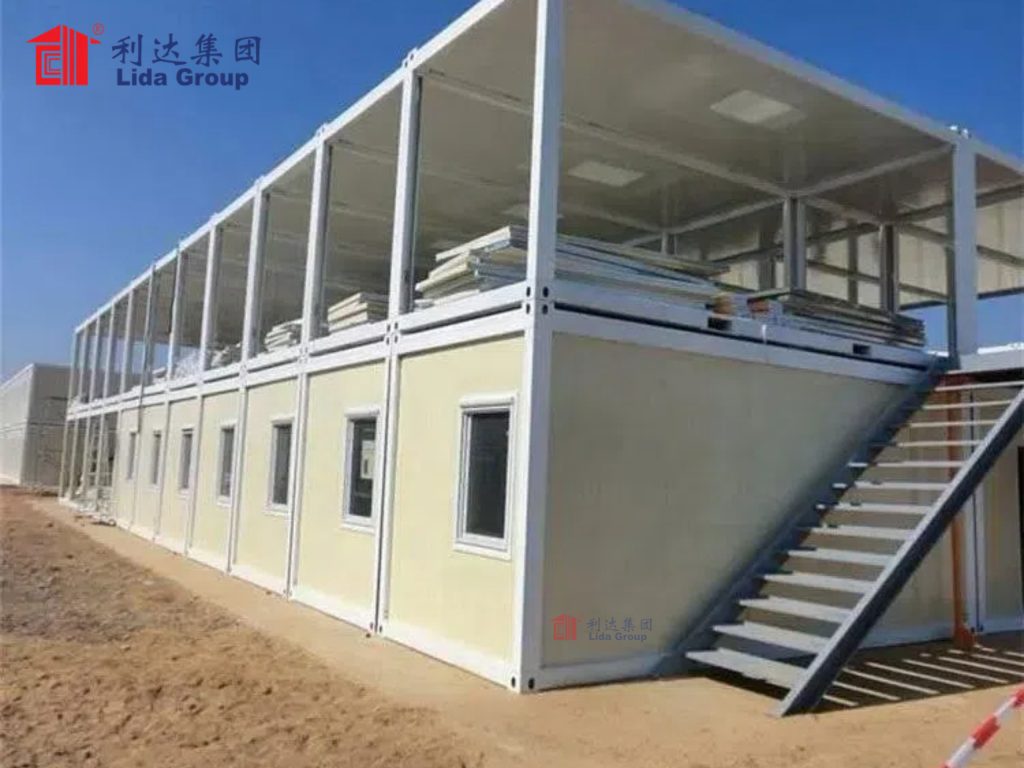
5. Real-World Applications: Case Studies of Lida Group’s Container House Solutions in Modern Worker Camps
To illustrate the impact of Lida Group’s container house solutions, it is helpful to examine real-world case studies where these solutions have been successfully implemented in modern worker camps. The following case studies highlight the diverse applications of Lida Group’s products and the positive outcomes they have delivered for clients and workers.
5.1 Case Study 1: Construction Camp in a Remote Desert Area
A large construction company was tasked with building a new highway in a remote desert area, where temperatures often exceed 45°C (113°F) in summer and drop to below 10°C (50°F) in winter. The company needed to accommodate over 500 workers for a period of two years, and traditional accommodation options (such as tents and makeshift sheds) were deemed unsuitable due to the harsh desert conditions.
The construction company turned to Lida Group for a solution. Lida Group designed a worker camp consisting of 120 container houses, including dormitory rooms, a dining hall, a recreation room, a medical clinic, and bathroom/shower facilities. The container houses were insulated with high-quality polyurethane foam to withstand the extreme temperatures, and each dormitory room was equipped with air conditioning (powered by solar panels installed on the roof) to keep workers cool in summer. In winter, the insulation and heating systems ensured that the rooms remained warm and comfortable.
The camp also included a large dining hall that could accommodate all 500 workers at once, with a commercial kitchen equipped with modern appliances. The recreation room featured televisions, tables for games like chess and cards, and a small library, providing workers with a place to relax after work. The medical clinic was staffed by a full-time nurse and equipped with basic medical supplies to handle minor injuries and illnesses.
The implementation of Lida Group’s container house solution had a significant impact on the project. The camp was set up in just three weeks, allowing workers to start construction on the highway on schedule. Workers reported high levels of satisfaction with the accommodation, citing the comfortable rooms, clean facilities, and access to amenities. As a result, the turnover rate among workers was reduced by 30%, and productivity increased by 15%, as workers were more rested and motivated. The construction company also benefited from lower operational costs, as the energy-efficient design of the container houses reduced electricity and water bills.
5.2 Case Study 2: Mining Camp in a Cold Mountainous Region (Continued)
In addition to the dormitory rooms, Lida Group also designed a communal building that housed a dining hall, a gym, and a training center. The dining hall was equipped with large windows that offered views of the surrounding mountains, creating a more pleasant dining experience for workers. The gym included basic fitness equipment such as treadmills, weights, and exercise mats, allowing workers to stay active during their free time—a key factor in maintaining physical and mental health in remote locations. The training center was used to conduct safety workshops and skill-building sessions, helping workers enhance their professional capabilities while on-site.
The impact of the new container house camp was immediate and significant. Within the first three months of operation, the number of worker illnesses related to cold weather decreased by 40%, as the well-insulated container houses and efficient heating systems kept workers warm and protected from the harsh mountain climate. The company also saw a 25% reduction in diesel fuel consumption for heating, thanks to the solar-powered heating systems and the insulation of the container houses. This not only lowered operational costs but also reduced the camp’s carbon footprint, aligning with the mining company’s sustainability goals.
Worker satisfaction surveys conducted six months after the camp’s opening showed a 50% increase in overall satisfaction compared to the previous accommodation. Workers highlighted the comfortable living spaces, access to fitness facilities, and the availability of hot water as key factors contributing to their improved well-being. As a result, the mining company experienced a 20% reduction in worker turnover, which reduced the costs associated with recruiting and training new employees. The success of this project led the mining company to partner with Lida Group for two additional camps in other mountainous mining regions.
5.3 Case Study 3: Logistics Camp for a Port Expansion Project
A port authority undertaking a large-scale expansion project needed to accommodate over 800 logistics workers, engineers, and contractors for a three-year period. The project site was located near the coast, exposing the worker camp to high humidity, saltwater corrosion, and occasional tropical storms. Traditional accommodation options were deemed unsuitable due to their vulnerability to corrosion and storm damage, as well as the long construction time required to build them.
Lida Group was contracted to design and install a worker camp that could withstand the coastal environment while providing comfortable accommodation for the large workforce. The solution included 180 container houses, which were treated with anti-corrosion coatings to protect against saltwater damage. The container houses were also reinforced with wind-resistant frames to withstand the strong winds of tropical storms.
To address the high humidity, Lida Group installed dehumidification systems in each dormitory room and common area, ensuring that the internal environment remained dry and comfortable. The camp was designed with a modular layout, allowing for easy expansion if the workforce size increased. The accommodation included single-occupancy rooms for engineers, double-occupancy rooms for contractors, and four-person rooms for logistics workers, ensuring that the diverse needs of the workforce were met.
The camp also featured a large dining hall with a capacity of 300 people, multiple bathroom and shower blocks, a laundry facility, and a recreational area with outdoor seating and sports facilities (including a basketball court and a volleyball net). To support the logistical needs of the project, Lida Group also designed container-based offices and storage facilities for tools and equipment.
The implementation of the container house camp was completed in just five weeks, allowing the port expansion project to start on schedule. The anti-corrosion coatings and wind-resistant design proved effective during two tropical storms that hit the area within the first year, with no damage reported to the container houses. Workers reported high levels of satisfaction with the dry and comfortable living conditions, and the port authority noted a 18% increase in productivity due to the improved accommodation and reduced downtime caused by weather-related issues.
The success of this project demonstrated Lida Group’s ability to design container house solutions that are tailored to the unique challenges of coastal environments, further solidifying the company’s reputation as a leader in adaptive and durable worker accommodation.
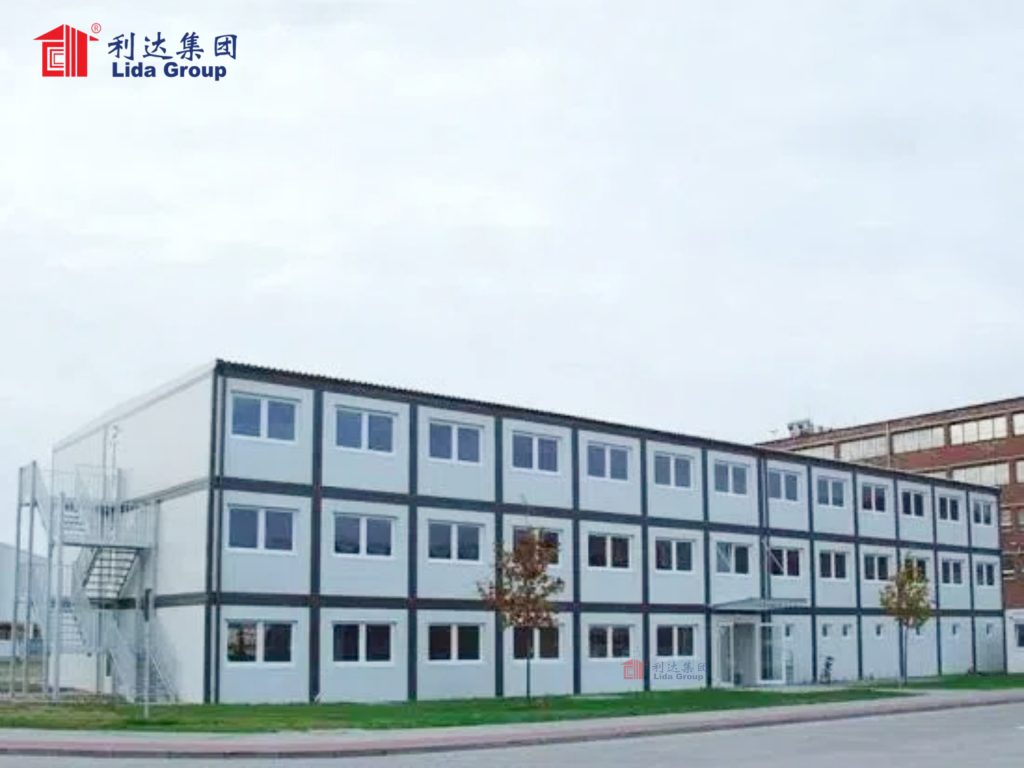
6. The Broader Impact of Lida Group’s Solutions on the Industry and Worker Well-Being
Lida Group’s container house solutions are not only transforming individual worker camps but also having a broader impact on the industrial sector and the well-being of workers worldwide. This section explores the key ways in which these solutions are driving positive change.
6.1 Raising Industry Standards for Worker Accommodation
For decades, worker accommodation has been a low priority for many companies in the construction, mining, and logistics sectors, with cost-cutting often taking precedence over worker welfare. Lida Group’s solutions are challenging this mindset by proving that high-quality accommodation can be both cost-effective and beneficial for business outcomes. By demonstrating the positive impact of improved accommodation on worker productivity, retention, and health, Lida Group is encouraging other companies to invest in better living conditions for their workers.
This shift is also being supported by evolving regulations and standards related to worker welfare. In many countries, governments are introducing stricter guidelines for worker accommodation, requiring companies to meet minimum standards for space, sanitation, and safety. Lida Group’s container house solutions are designed to comply with these regulations, making it easier for companies to meet their legal obligations while also enhancing worker well-being. As a result, the industry is seeing a gradual shift toward higher standards for worker accommodation, with Lida Group leading the way.
6.2 Enhancing Worker Well-Being and Mental Health
The impact of accommodation on worker well-being cannot be overstated. Poor living conditions can lead to chronic stress, anxiety, and physical health issues, which not only affect workers’ quality of life but also their ability to perform their jobs effectively. Lida Group’s container house solutions address these issues by providing workers with comfortable, safe, and functional living spaces that meet their basic needs and enhance their overall quality of life.
The spacious layouts, private sleeping areas, and access to amenities such as recreation rooms and fitness facilities help to reduce stress and improve mental health. Workers in Lida Group’s container house camps report feeling more rested, motivated, and connected to their colleagues, which has a positive impact on their overall job satisfaction. This, in turn, leads to lower rates of absenteeism and turnover, as workers are more likely to stay with a company that prioritizes their well-being.
6.3 Promoting Sustainability in the Industrial Sector
As global industries face increasing pressure to reduce their environmental impact, Lida Group’s container house solutions are playing a key role in promoting sustainability. The use of recycled materials, energy-efficient design, and renewable energy options (such as solar panels) helps to reduce the carbon footprint of worker camps, aligning with the sustainability goals of many companies and industries.
Moreover, the prefabricated nature of container houses minimizes construction waste, as most of the manufacturing process takes place in a controlled factory environment where materials are used efficiently. This is in stark contrast to traditional on-site construction, which often generates large amounts of waste due to imprecise cutting, material damage, and over-ordering. By reducing waste and energy consumption, Lida Group’s solutions are helping to make the industrial sector more environmentally responsible.
6.4 Supporting Economic Development in Remote Areas
Worker camps are often located in remote areas where economic opportunities are limited. The construction and operation of Lida Group’s container house camps can have a positive impact on local economies by creating jobs in areas such as transportation, installation, and maintenance. Additionally, the presence of a large workforce can stimulate local businesses, such as restaurants, shops, and service providers, as workers spend money in the local community.
In some cases, Lida Group also partners with local suppliers to source materials and services, further supporting local economic development. This not only benefits the local community but also helps to build positive relationships between the project company and the local population, reducing potential conflicts and improving the social license to operate.
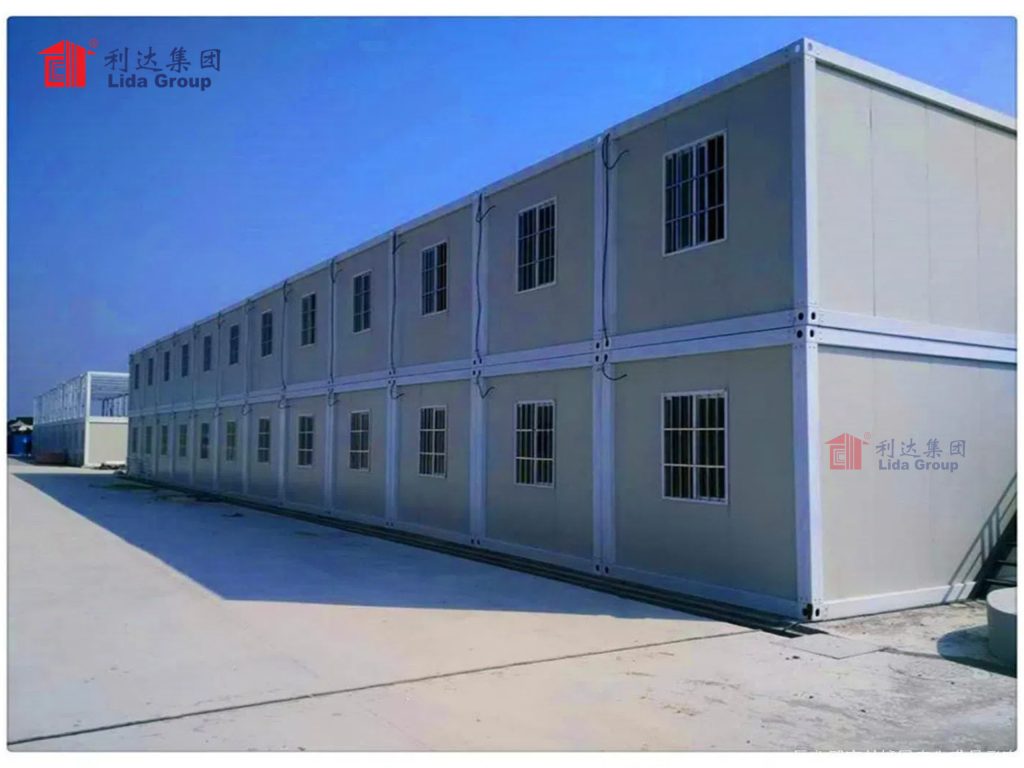
7. Future Trends and Innovations in Container House Solutions for Worker Camps
The container house industry is constantly evolving, driven by advancements in technology, changing customer needs, and growing concerns about sustainability. Lida Group is at the forefront of these developments, continuously investing in research and development to enhance its solutions and stay ahead of emerging trends. This section explores some of the key future trends and innovations that are likely to shape the future of container house solutions for worker camps.
7.1 Smart Camp Technology
The integration of smart technology into worker camps is a growing trend that is expected to gain momentum in the coming years. Lida Group is exploring the use of smart sensors, Internet of Things (IoT) devices, and digital management systems to enhance the efficiency, safety, and comfort of its container house camps.
For example, smart sensors can be installed in container houses to monitor temperature, humidity, and air quality, allowing camp managers to adjust heating, cooling, and ventilation systems in real time to optimize comfort and energy efficiency. IoT devices can also be used to monitor water and electricity usage, helping to identify areas where consumption can be reduced. Digital management systems can streamline camp operations by automating tasks such as room allocation, maintenance requests, and waste management, reducing administrative burdens and improving overall efficiency.
In addition, smart security systems, such as facial recognition access control and video surveillance, can enhance the safety of worker camps by preventing unauthorized access and monitoring for potential security threats. These technologies not only improve the functionality of worker camps but also provide valuable data that can be used to optimize operations and improve the living experience for workers.
7.2 Advanced Insulation and Climate Control
As climate change leads to more extreme weather conditions, the need for effective insulation and climate control in worker camps is becoming increasingly important. Lida Group is investing in the development of advanced insulation materials that offer better thermal performance and durability. For example, the company is exploring the use of aerogel insulation, which is lightweight, waterproof, and has excellent thermal insulation properties, making it ideal for use in extreme temperatures.
In addition to advanced insulation, Lida Group is also developing more efficient climate control systems, such as heat pumps and geothermal heating, which can reduce energy consumption while providing reliable heating and cooling. These systems can be combined with renewable energy sources, such as solar and wind power, to create fully sustainable climate control solutions that are both cost-effective and environmentally friendly.
7.3 Modular and Customizable Designs
The demand for modular and customizable container house solutions is expected to grow as companies seek to meet the diverse needs of their workforces. Lida Group is expanding its range of modular designs, allowing clients to easily combine different container units to create custom camp layouts. For example, a client can combine dormitory units, common area units, and facility units (such as medical clinics or gyms) to create a camp that is tailored to their specific requirements.
Moreover, Lida Group is offering more customization options for the interior of container houses, allowing workers to personalize their living spaces to a greater extent. This includes options for different flooring materials, wall colors, and furniture configurations, as well as the ability to add personal storage solutions. By offering more customization, Lida Group is helping to create a more homely environment for workers, which can further improve their well-being and job satisfaction.
7.4 Circular Economy Practices
The adoption of circular economy practices is a key trend in the sustainable building industry, and Lida Group is leading the way in applying these practices to container house solutions. The circular economy focuses on reducing waste, reusing materials, and recycling products at the end of their life cycle.
Lida Group is designing container houses with recyclability in mind, using materials that can be easily separated and recycled when the house reaches the end of its useful life. The company is also exploring options for reusing container houses, such as repurposing them for other applications (such as storage facilities or temporary offices) once a worker camp is no longer needed. Additionally, Lida Group is working to establish take-back programs for its container houses, allowing clients to return old or unused units for recycling or repurposing, further reducing waste and promoting sustainability.
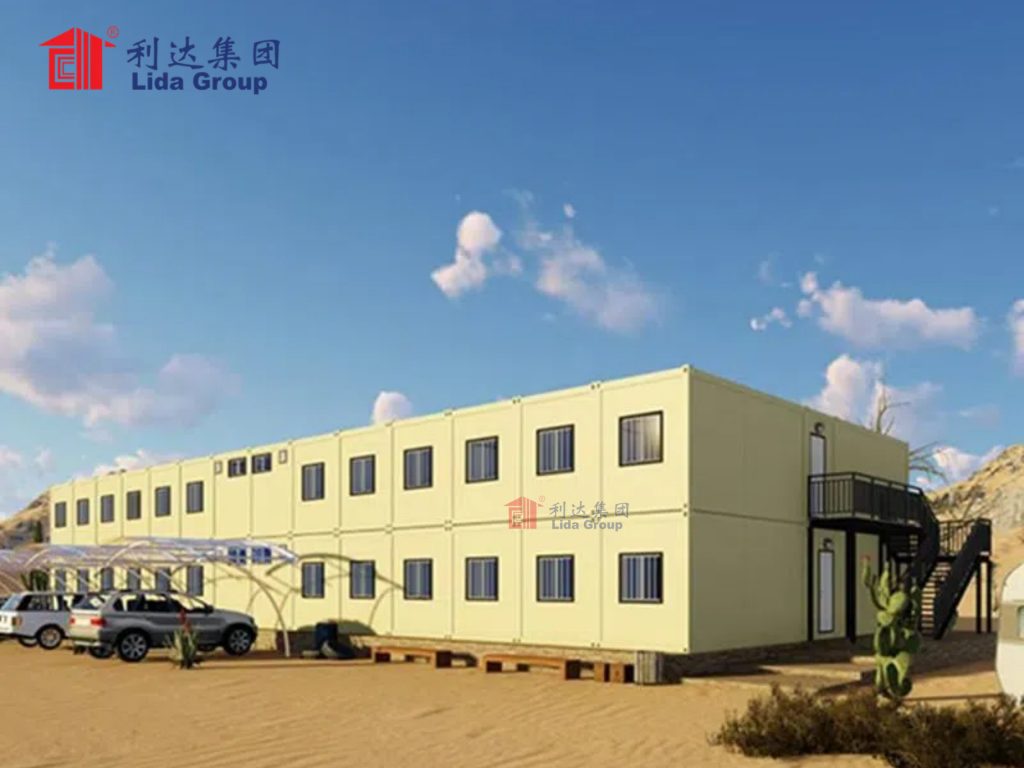
8. Conclusion
Lida Group’s high-quality container house solutions are revolutionizing the standards of worker accommodation in modern worker camps, addressing long-standing challenges such as inadequate space, poor sanitation, environmental vulnerability, slow construction, and lack of sustainability. By combining durability, comfort, efficiency, and adaptability, these solutions are not only improving the living conditions of workers but also delivering tangible benefits for companies, including increased productivity, reduced turnover, lower operational costs, and enhanced compliance with worker welfare regulations.
The real-world case studies presented in this article demonstrate the diverse applications of Lida Group’s solutions, from remote desert construction camps to cold mountainous mining regions and coastal logistics camps. In each case, the container house solutions have proven to be effective in addressing the unique challenges of the environment while meeting the specific needs of the workforce. The positive outcomes—including reduced illness rates, improved worker satisfaction, and lower energy consumption—highlight the transformative impact of these solutions on both workers and businesses.
Beyond individual projects, Lida Group’s solutions are having a broader impact on the industrial sector by raising industry standards for worker accommodation, promoting sustainability, and supporting economic development in remote areas. The company’s commitment to innovation, quality, and sustainability is driving the evolution of the container house industry, with future trends such as smart camp technology, advanced insulation, and circular economy practices set to further enhance the functionality and environmental performance of worker camps.
As global industries continue to grow and evolve, the need for high-quality, sustainable worker accommodation will only increase. Lida Group’s container house solutions are well-positioned to meet this demand, offering a comprehensive and innovative alternative to traditional housing. By prioritizing worker well-being and sustainability, Lida Group is not only transforming worker accommodation but also contributing to a more responsible and inclusive industrial sector—one where workers are valued, and the environment is protected.
In the years to come, Lida Group is likely to remain a leader in the container house industry, continuing to innovate and adapt its solutions to meet the changing needs of clients and the evolving challenges of the global environment. For companies seeking to improve worker accommodation, reduce costs, and enhance sustainability, Lida Group’s container house solutions represent a smart and forward-thinking investment—one that delivers benefits for workers, businesses, and the planet alike.
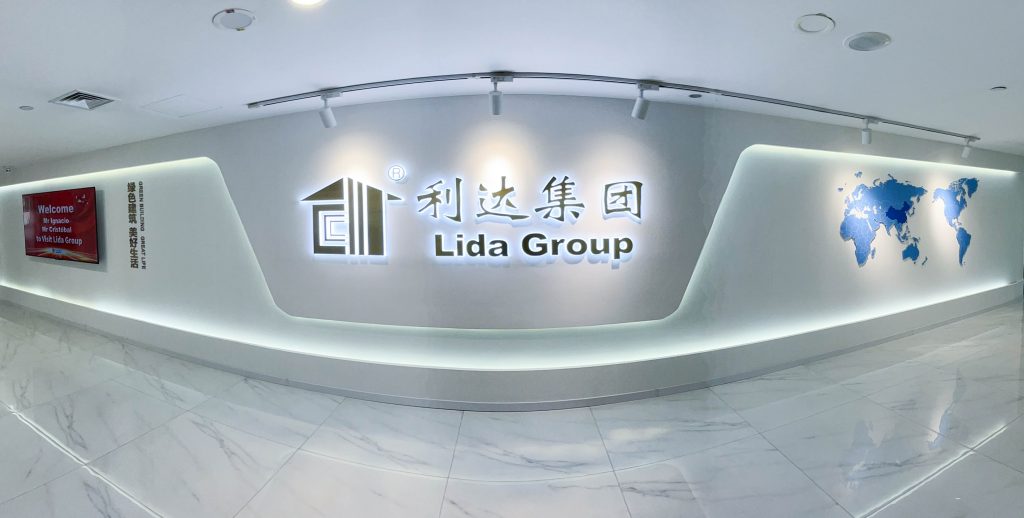
Related news
-
Transforming Poultry and Livestock Management with Lida Group's Ventilated and Hygienic Steel Frame Building Solutions
2025-09-15 14:54:21
-
The Future of Farming Infrastructure: Smart Technology Integration in Lida Group's High-Quality Steel Farm Houses
2025-09-15 14:48:27
-
Cost-Effective Expansion for Agribusiness: Lida Group's Pre-Engineered Steel Farm Houses Reduce Construction Time and Budget
2025-09-15 14:26:24
contact us
- Tel: +86-532-88966982
- Whatsapp: +86-13793209022
- E-mail: sales@lidajituan.com


